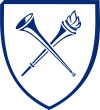Student Learning Outcomes
Oxford College teaching librarians, with input from faculty, developed a list of information literacy learning outcomes based on the Association of College and Research Libraries' Framework for Information Literacy for Higher Education, targeted specifically for Oxford's unique academic curriculum.
Upon leaving Oxford College, students should be able to understand and work within the following information literacy threshold concepts:
Outcomes:
- Students will be able to evaluate a resource using a variety of criteria to determine whether it meets their information need.
- Students will be able to evaluate sources for currency, reliability, validity, accuracy, authority, and bias to determine their credibility.
- Students will be able to explain that a resource's authority/authoritativeness is dependent on its creator and the context in which it is used.
- Students will be able to identify possible audiences, purposes, viewpoints and expertise of authors of information resources.
Outcomes:
- Students will be able to link the processes involved in information creation to a particular information need.
- Students will be able to distinguish between primary and secondary sources to select appropriate sources for their research.
- Students will be able to identify common characteristics of a variety of information source types to differentiate scholarly, trade, and popular publications.
- Students will recognize that scholarly research materials exist in a variety of formats and will select resources that meet their needs regardless of medium.
Outcomes:
- Students will be able to describe the legal and socioeconomic influences in information production and dissemination to use information legally and ethically.
- Students will be able to apply intellectual property laws to their use of an information source to use it legally.
- Students will be able to cite information sources (regardless of format, such as data and images) to give credit to the original ideas of others.
Outcomes:
- Students will recognize that research is an iterative process that requires ongoing inquiries.
- Students will identify information gaps to formulate research questions.
- Students will revise their research questions in response to new information or understandings.
Outcomes:
- Students will be able to demonstrate that research and knowledge creation involve listening to, acknowledging, and responding to others’ related ideas.
- Students will use a variety of resources to address the various perspectives on an issue.
- Students will be able to describe the role of the peer-review process.
- Students will be able to trace citations representing the scholarly conversation on a topic.
Outcomes:
- Students will be able to align search strategies to information needs to work in a variety of information systems.
- Students will be able to develop effective research plans for locating information relevant to a research question.
- Students will be able to determine an appropriate scope of investigation to meet project requirements.
- Students will be able to identify key concepts and related terms to locate relevant sources for their projects.
- Students will be able to use subject headings and other controlled vocabularies to find additional relevant resources and limit their searches.
- Students will be able to retrieve books, articles, and other media to access information appropriate to their needs.
